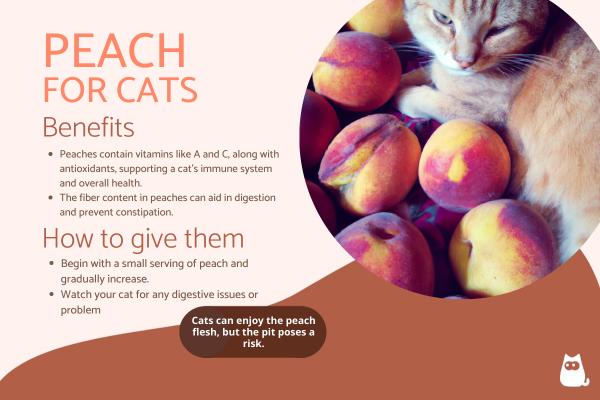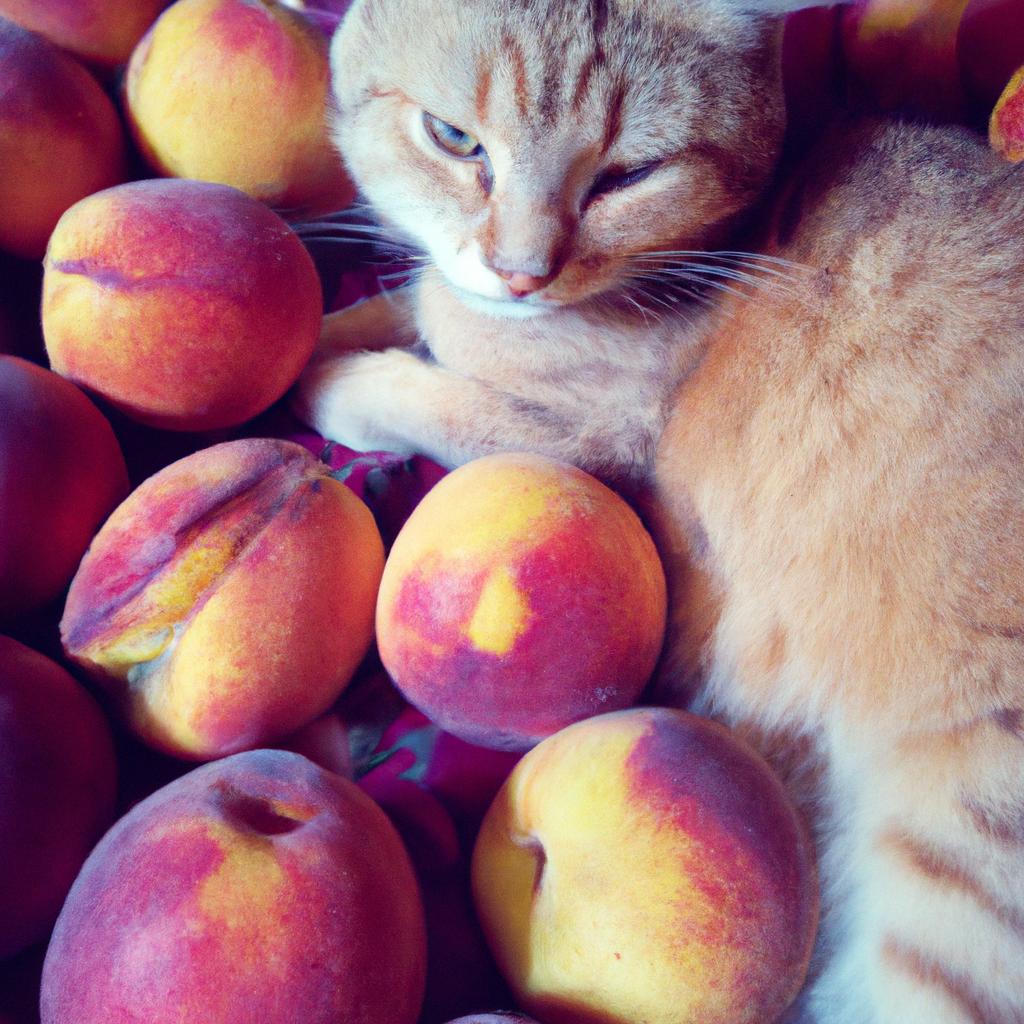Can Cats Eat Peaches?



See files for Cats
Cats, as obligate carnivores, derive their primary nutrition from animal-based proteins. Unlike humans, their ability to digest and utilize plant-based nutrients is limited. Therefore, understanding what cats can and cannot eat is essential to safeguard their health and prevent potential dietary complications.
In this AnimalWised article, we will explore the various aspects of feeding peaches to cats, delving into the potential benefits and risks associated with this fruit. We will also provide practical advice on how to safely introduce peaches to your cat's diet and identify the warning signs of potential complications.
Can cats eat peaches or not?
The peach, a beloved fruit native to China, Iran, and Afghanistan, has captivated taste buds worldwide with its succulent flesh and delightful flavor. But can our curious feline companions safely indulge in this sweet treat? The answer is yes, but with caution. While cats can enjoy the soft, fleshy part of the peach, the stone, or pit poses a significant risk.
The pit contains amygdalin, a compound that can break down into benzaldehyde, glucose, and cyanide when exposed to an enzyme called emulsine. Cyanide, even in small amounts, is highly toxic to cats and can lead to serious health complications.
Can cats eat canned peaches?
Canned peaches, on the other hand, typically do not contain the pit, eliminating the immediate choking hazard. However, these peaches are often packed in syrup or juice, which contain high amounts of added sugar. Excessive sugar intake can lead to various health problems in cats, including obesity, diabetes, and dental issues.
Can cats eat dried peaches?
No, it's not recommended to feed cats dried peaches. Dried fruits, including dried peaches, are often high in concentrated sugars, additives, and preservatives that can be harmful to cats. The lack of water content in dried fruits may also contribute to dehydration in cats.
Learn more about the fruits and vegetables that are good for cats in this other article.

Benefits of peaches for cats
Peaches, when given in moderation and prepared appropriately, can offer some potential benefits for cats, these include:
- Hydration: peaches have a high water content (80-90%), which can contribute to a cat's overall hydration, especially if they are not fond of drinking water.
- Vitamins and antioxidants: peaches contain vitamins like vitamin A and C, as well as antioxidants. These nutrients can support a cat's immune system and contribute to overall health.
- Fiber: the fiber content in peaches may aid in digestion and help prevent constipation in cats.
- Low in fat and sodium: peaches are naturally low in fat and sodium, which makes them a suitable treat for cats who are overweight or have certain health conditions.
If you're considering introducing peaches to your cat's diet, consult with your veterinarian first to determine the appropriate amount and frequency for your cat's individual needs.
How to give peaches to my cat?
Introducing peaches to your cat's diet requires careful preparation and moderation to ensure their safety and well-being. Here's a step-by-step guide on how to give peaches to your cat:
- Opt for fresh, ripe peaches that are free from blemishes or bruises. Avoid canned peaches, which often contain excessive sugar and artificial ingredients.
- Wash the peaches thoroughly under running water to remove any dirt, pesticides, or other contaminants.
- Carefully cut the peach in half and remove the pit or stone. The pit poses a choking hazard and contains toxic compounds, so it's crucial to eliminate it entirely.
- Slice the peach flesh into small, bite-sized pieces to make it easier for your cat to eat and digest.
- Start by offering a small piece of peach to your cat as an occasional treat. Observe their reaction and monitor their digestive system for any signs of discomfort.
Remember, peaches should only be given as an occasional treat in small quantities. Overfeeding can lead to health issues in cats which we will explore in the following sections.
Find out how to create a healthy and balanced diet for your cat in this other article.

Recommended dosage of peach for cats
The appropriate dosage of peaches for cats depends on several factors, including the cat's age, size, overall health, and activity level. However, as a general guideline, it's recommended to start with a very small piece of peach flesh, no larger than a blueberry or raspberry.
Observe your cat's reaction and monitor their digestive system for any signs of discomfort. If your cat tolerates the initial portion well, you can gradually increase the amount to a maximum of one teaspoon of peach flesh per day, depending on your cat's size and activity level.
Here's a more detailed breakdown of the recommended dosage based on cat size:
- Small cats (under 10 pounds): start with a piece of peach flesh no larger than a blueberry or raspberry. Gradually increase to a maximum of 1/2 teaspoon per day.
- Medium cats (10-15 pounds): Start with a piece of peach flesh no larger than a raspberry or strawberry. Gradually increase to a maximum of 1 teaspoon per day.
- Large cats (over 15 pounds): Start with a piece of peach flesh no larger than a strawberry. Gradually increase to a maximum of 2 teaspoons per day.
Remember, these are just general guidelines, and it's always best to consult with your veterinarian before introducing new foods to your cat's diet. They can assess your cat's individual needs and provide personalized advice on the appropriate dosage of peaches for your feline friend.
Side effects of peaches for cats
While peaches can be an occasional treat for cats, overfeeding or consuming certain parts of the peach can lead to adverse effects.
Excessive consumption of peaches, particularly the fiber content, can cause digestive upset, diarrhea, and soft stools in cats. This is due to the fact that their digestive systems are not well-adapted to processing large amounts of plant-based fiber.
The peach pit or stone poses a serious choking hazard for cats. It can lodge in their throats, obstructing their airway and causing respiratory distress. Always remove the pit entirely before offering peaches to your cat.
The peach pit contains amygdalin, a compound that breaks down into benzaldehyde, glucose, and cyanide when exposed to an enzyme called emulsine. While the cyanide content is relatively low, excessive consumption of peach pits can lead to cyanide poisoning, causing symptoms such as vomiting, weakness, and seizures.
Peaches contain natural sugars, and overfeeding can contribute to weight gain in cats. Obesity is a major health concern for cats, increasing the risk of diabetes, joint problems, and other complications.

Contraindications of peaches for cats
While peaches can be an occasional treat for cats in moderation, there are certain situations when it's best to avoid feeding them peaches. Here are some contraindications of peach for cats:
Peaches contain natural sugars, which can raise blood sugar levels in cats with diabetes. If your cat has diabetes, it's best to avoid feeding them peaches altogether.
Pancreatitis is an inflammation of the pancreas, and peaches can exacerbate this condition. If your cat has pancreatitis, it's best to avoid feeding them peaches until the condition has resolved.
Peaches can contribute to weight gain in cats, so it's best to avoid feeding them to overweight or obese cats. If your cat is overweight or obese, consult with your veterinarian about a suitable diet plan.
Peaches can cause digestive upset in some cats, especially those with sensitive stomachs. If your cat has a history of digestive problems, it's best to proceed with caution when introducing peaches to their diet.
Very young kittens and older cats may have difficulty digesting peaches due to their immature or weakened digestive systems. It's best to consult with your veterinarian before introducing peaches to these cats.
Some cats may have allergies to peaches or other fruits. If you notice any signs of an allergic reaction, such as hives, itching, or vomiting, stop feeding peaches to your cat immediately and consult your veterinarian.
Certain medications may interact with the compounds in peaches, potentially altering their effectiveness or causing adverse reactions. Consult with your veterinarian if your cat is taking any medications before introducing peaches to their diet.
Protect your feline friend from potential harm with our comprehensive list of fruits and vegetables that are off-limits for cats.
If you want to read similar articles to Can Cats Eat Peaches?, we recommend you visit our Homemade diets category.








